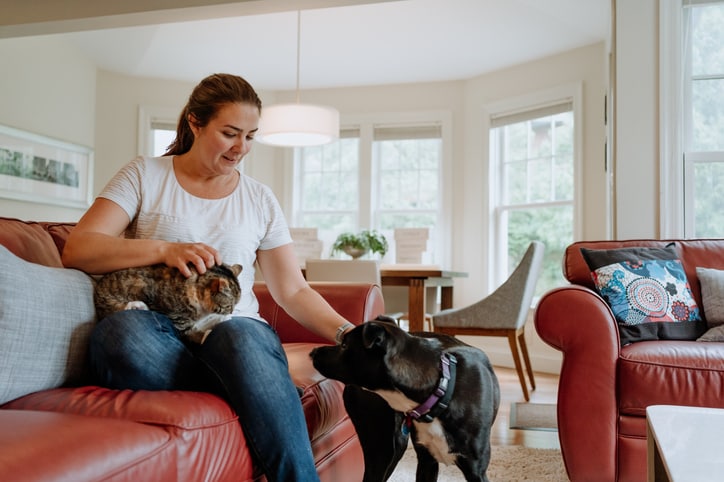Have you ever heard your dog wheezing? This sound can be alarming for any loving pet parent out there. Though it may sound like an asthma attack, in actuality, this type of labored breathing can indicate a variety of health issues, ranging in levels of severity. In many cases, your dog might simply have environmental allergies, which can be triggered by both indoor and outdoor allergens, says Dr. Erin Redeker-Goelitz, a veterinarian at Spring Hill Veterinary Clinic in Carpentersville, Illinois.
All dogs, no matter their age, may develop allergies at some point, though flat-faced breeds like pugs are bulldogs are more susceptible, according to the American Society for the Prevention of Cruelty to Animals. Here’s an overview of typical allergy triggers and what you can do around your house to help alleviate your dog’s symptoms.
Common Indoor Allergens
According to Dr. Redeker-Goelitz, indoor triggers include secondhand smoke, dust, mold, cleaning chemicals, incense, perfumes, topical pet products, shampoos and irritating fabrics. Dogs with particularly sensitive airways can also be bothered by scented candles and air fresheners, says Dr. Wendy Mandese, a veterinarian and an assistant clinical professor at the University of Florida College of Veterinary Medicine. In addition, chemicals in flea control products may cause your dog to wheeze, as well.
Here are two steps you can take to help alleviate your dog’s indoor allergy symptoms.
- Avoid Scented Products
“For airway irritation, it is important to avoid using scented candles or air fresheners,” says Dr. Mandese. “Sometimes it is even necessary to use unscented detergents” when you are cleaning your dog’s bedding, she explains.
- Don’t Smoke Around Your Dog
“Many pups have a low tolerance for secondhand smoke,” says Dr. Mandese. If quitting entirely isn’t an option, smoke outside while wearing a jacket. Remove the coat once you come back in to keep smoky odors to a minimum.
Common Outdoor Allergens
According to Dr. Redeker-Goelitz, outdoor irritants come primarily from trees, grass, weeds and flowers. In fact, as Dr. Mandese points out, pollen is the most common irritant for dogs. Dog wheezing may also be caused by chemicals in pesticides.
Here are three steps you can take to help alleviate your dog’s outdoor allergy symptoms.
- Keep Your Windows Closed and Your Air Ducts Clean
“If a pet suffers from outdoor allergens, closing windows during affected seasons may help,” says Dr. Redeker-Goelitz. This will prevent the allergens from entering your home. Furthermore, if your dog is allergic to dust, you can alleviate his allergy symptoms by keeping your air ducts and vents clean.
- Bathe Your Pet on a Regular Basis
“Dogs with allergies can be bathed weekly or several times a week with soothing shampoos like aloe or oatmeal,” says Dr. Redeker-Goelitz. If your pet’s allergy symptoms are particularly troublesome, you can get a prescription shampoo from your veterinarian and give that to your groomer. - Check the Pollen Count Before Going Outside
You can check daily pollen counts in your area by visiting the American Academy of Allergy, Asthma & Immunology. On days when there is a high pollen count, you should limit your dog’s time spent outdoors. And, as an additional precautionary measure, you should rinse off your pet’s paws whenever he comes into your house after spending time outside, says Dr. Mandese. This process will allow you to ensure that your dog does not bring pollen inside with him.
For more on dogs, check out What is Reverse Sneezing in Dogs?
Erin Chan Ding is a freelance journalist based in Chicago, who writes about news, business, features, entertainment, profiles, parenting and pets.
* This article is for general informational purposes only. It is not intended nor implied to be providing medical advice and is not a substitute for such advice. The reader should always consult a health care provider concerning any medical condition or treatment plan. Neither Care.com nor the author assumes any responsibility or liability with respect to use of any information contained herein.







